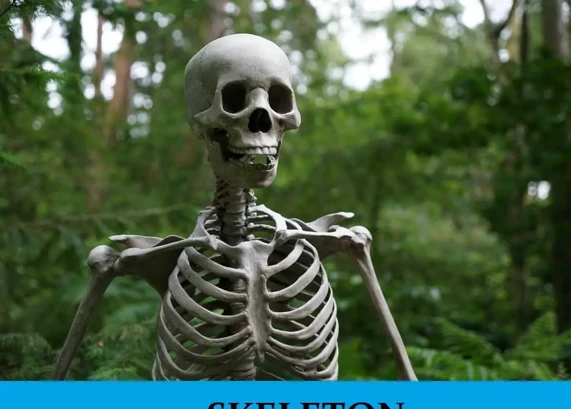The mystery and symbolism behind dreams have long intrigued believers and non-believers alike. When it comes to understanding the deeper meaning behind our dreams, the Bible often serves as a source of guidance and interpretation. One recurring image that can leave us perplexed is the appearance of a skeleton in a dream. In this article, we will delve into the biblical meaning of skeletons in dreams, unraveling the symbolism and exploring the various interpretations within the context of biblical stories and teachings. By examining the possible connotations and understanding the significance of this powerful symbol, we can gain insight into our own subconscious and the messages our dreams may be trying to convey.
Contents
- The Symbolism of Skeletons in the Bible
- Interpreting Dreams of Skeletons
- Common Biblical Symbolism Associated with Skeletons
- Other Possible Interpretations
- How to Respond to a Dream of Skeletons
- Conclusion
-
Frequently Asked Questions
- 1. What does it mean to dream about a skeleton in the Bible?
- 2. Are dreams of skeletons in the Bible only negative?
- 3. Can dreaming of a skeleton indicate personal fear or vulnerability?
- 4. How can I interpret my dream of a skeleton in a biblical context?
- 5. Can dreaming about a skeleton signify the release of past traumas?
- 6. Should I be concerned if I frequently dream about skeletons?
- 7. How can I respond to a dream of skeletons in a productive way?
- 8. Can dreams about skeletons have religious or spiritual significance?
- 9. How can dreams of skeletons encourage personal transformation?
- 10. Is it necessary to seek guidance after dreaming about skeletons in the Bible?
- References
The Symbolism of Skeletons in the Bible
– The Concept of Skeletons in the Bible: In the Bible, skeletons are often associated with the concept of death and mortality. They serve as a powerful reminder of the transitory nature of life and the inevitability of physical decay (dust to dust). This symbolism can be seen in various verses throughout the Bible, such as in Ecclesiastes 12:7, where it states that “the dust returns to the ground it came from, and the spirit returns to God who gave it.” The presence of skeletons in biblical narratives signifies the fragility of human existence and serves as a call to reflect upon our own mortality and the brevity of life.
– Interpretations in Biblical Stories: Skeletons are not only used as a direct symbol of mortality but also feature in biblical stories as a representation of repentance, judgment, and resurrection. For instance, the story of Ezekiel’s vision in the Valley of Dry Bones (Ezekiel 37:1-14) portrays God’s power to bring life back to dry bones and symbolizes the spiritual rejuvenation and restoration of the nation of Israel. This narrative highlights the transformative and redemptive power of God as He can bring forth life and renewal even in seemingly lifeless situations. Other stories like the raising of Lazarus (John 11:1-44) further emphasize the theme of resurrection and the ability of God to overcome death.
– The symbolism of skeletons in the Bible reflects the realities of human existence, the consequences of sin, and the hope of redemption. Through various narratives and metaphors, the Bible uses skeletons as a powerful symbol to convey profound spiritual truths and encourage believers to reflect on their mortality, seek repentance, and place their trust in the resurrection power of God. It is through understanding these biblical interpretations that we can begin to unravel the deeper meaning of dreams involving skeletons and decipher the messages they may hold for us.
The Concept of Skeletons in the Bible
The concept of skeletons in the Bible revolves around the idea of death and mortality. Here are some key points to consider:
– Symbol of Mortality: In the Bible, skeletons represent the fragility and impermanence of human life. They serve as a stark reminder that our physical bodies will eventually return to dust, as mentioned in Genesis 3:19. This concept emphasizes the fleeting nature of human existence and encourages reflection on the brevity of life.
– Spiritual Significance: Skeletons also have spiritual significance in the Bible. They symbolize the separation of the soul from the physical body upon death. Ecclesiastes 12:7 illustrates this idea, stating that “the dust returns to the ground it came from, and the spirit returns to God who gave it.” This verse highlights the belief that our life force comes from God and, upon death, our spirit returns to Him.
– Vanitas Theme: The presence of skeletons in biblical narratives aligns with the vanitas theme, which emphasizes the emptiness and vanity of worldly pursuits. Ecclesiastes 1:2 serves as a prime example, stating that “Vanity of vanities, says the Preacher, vanity of vanities! All is vanity.” This theme reminds believers to focus on eternal truths and prioritize spiritual matters over worldly pursuits.
By understanding the concept of skeletons in the Bible and their symbolic meaning, we can begin to interpret dreams involving skeletons with greater depth and discern the spiritual messages they may convey.
Interpretations in Biblical Stories
– Evaluating the story of Adam and Eve: The biblical story of Adam and Eve offers another perspective on the symbolic interpretation of skeletons. When Adam and Eve disobeyed God’s commandment in the Garden of Eden, they experienced spiritual death, separation from God, and the introduction of physical death into the world. The consequences of their actions led to the introduction of mortality and the decay of their physical bodies. In this context, skeletons can be seen as a reminder of the Fall and the consequences of sin.
– The relevance of the Valley of Dry Bones: The vision of the Valley of Dry Bones in the book of Ezekiel provides a profound allegorical interpretation of skeletons. In this vision, Ezekiel witnesses a valley filled with dry bones, signifying the spiritual condition of the nation of Israel. However, through the power of God, the bones are brought back to life, representing the restoration and revival of the spiritually dead nation. The story symbolizes God’s ability to bring repentant sinners back to life and offers hope for transformation and renewal, even in the direst circumstances.
– The resurrection of Lazarus: The account of Lazarus being raised from the dead by Jesus showcases the theme of resurrection in the Bible. Lazarus, who had been dead and buried for four days, was brought back to life by Jesus’ command. This powerful example of resurrection foreshadows Jesus’ own victory over death through His crucifixion and resurrection. The story illustrates the transformative power of Jesus and highlights the hope of resurrection and new life that believers can find in Him.
Interpretations in biblical stories surrounding skeletons provide profound insights into the themes of mortality, sin, repentance, and resurrection. These stories help us understand how skeletons symbolically represent these concepts, offering us deeper interpretations of dreams involving skeletons and encouraging us to reflect on our own spiritual condition and the hope found in God’s redemptive power.
Interpreting Dreams of Skeletons
– Exploring Personal Associations: When interpreting dreams of skeletons, it is important to consider our personal associations with this symbol. What emotions, fears, or memories does the image of a skeleton evoke for you? Reflecting on these associations can provide valuable insight into the underlying meaning of the dream. Perhaps the skeleton represents a fear of mortality or a reminder of past traumas. By connecting these personal associations with the symbolism of skeletons in the Bible, we can begin to unravel the message our subconscious is trying to convey.
– Examining Context and Emotions: In dream analysis, the context and emotions surrounding the appearance of a skeleton are crucial. Was the skeleton surrounded by darkness, representing fear or guilt? Or was it bathed in light, symbolizing transformation and rebirth? Understanding the emotional tone of the dream and the specific circumstances can provide further clues to its interpretation. Additionally, taking note of any other symbols or events in the dream can help paint a more complete picture of its meaning.
– Interpreting dreams is a deeply personal and subjective process. While the symbolism of skeletons in the Bible can provide a foundation for interpretation, it is essential to remember that dreams are highly individualized experiences. By delving into our personal associations and examining the context and emotions of the dream, we can unlock the hidden messages and insights our subconscious is trying to communicate.
Exploring Personal Associations
– Exploring Personal Associations: When interpreting dreams of skeletons, it is important to consider our own personal associations with this symbol. The meaning of skeletons can vary greatly depending on our individual experiences, beliefs, and cultural backgrounds. Some may associate skeletons with fear and the macabre, while others may view them as a symbol of transformation or spiritual growth. Reflecting on our own feelings, emotions, and memories associated with skeletons can provide valuable insights into the interpretation of our dreams. Additionally, examining any personal connections to skeletons within the context of our religious or spiritual beliefs can further enhance our understanding of the biblical symbolism they represent. It is through this introspective exploration that we can uncover the unique significance that skeletons hold for us individually and better comprehend the messages embedded within our dreams.
Examining Context and Emotions
Examining the context and emotions surrounding a dream of skeletons is crucial in understanding its symbolism. The emotions experienced during the dream can provide valuable insights into its meaning. For example, if the dream elicits feelings of fear or anxiety, it may suggest a deep-seated fear of emptiness or vulnerability. On the other hand, if the dream evokes feelings of curiosity or wonder, it could indicate a desire for self-discovery and introspection. Additionally, taking into account the context of the dream, such as the location, people involved, or specific events, can provide further clues to its interpretation. By analyzing these aspects, we can gain a better understanding of the personal associations and hidden messages behind the dream of skeletons.
Common Biblical Symbolism Associated with Skeletons
– Death and Mortality: One of the most common biblical symbolism associated with skeletons is the idea of death and mortality. Skeletons serve as a stark reminder of the fleeting nature of human life and the certainty of physical decay. They highlight the biblical truth that “it is appointed for man to die once, and after that comes judgment” (Hebrews 9:27). By contemplating the symbolism of skeletons, we are encouraged to reflect on our mortality and consider the importance of making the most of our time on earth.
– Repentance and Transformation: Skeletons in the Bible also symbolize repentance and transformation. They often represent the lifeless state of an individual before experiencing a spiritual renewal or conversion. Just as the dry bones in Ezekiel’s vision were brought back to life (Ezekiel 37:1-14), skeletons can signify the potential for inner transformation and the need to turn away from sin. They remind us that through repentance, we can experience a new life in Christ and be restored to spiritual wholeness.
– Judgment and Consequences: Skeletons can also carry the symbolism of judgment and consequences for actions. In biblical narratives, they are often associated with the destruction and punishment of those who have rebelled against God. For example, the Valley of Dry Bones in Ezekiel’s vision represents the judgment and exile that the nation of Israel faced due to their disobedience. The presence of skeletons in dreams may act as a warning to examine our own actions and consider the potential consequences of our choices.
– Resurrection and Rebirth: Lastly, skeletons in the Bible symbolize resurrection and rebirth. They signify the hope of new life that comes through faith in Christ. Just as Jesus conquered death and was resurrected, believers are assured of their own resurrection and eternal life. The imagery of skeletons can remind us of the promise of resurrection and the hope that lies beyond the physical confines of this earthly existence.
Understanding these common biblical symbolism associated with skeletons can provide deeper insight into the meaning of dreams involving skeletons. By recognizing these multiple layers of symbolism, we can decipher the messages and lessons that may be conveyed through such dreams.
Death and Mortality
Death and mortality are fundamental themes in the Bible, and the symbolism of skeletons is closely tied to these concepts. The presence of skeletons serves as a stark reminder of the temporary nature and fragility of human life. In Ecclesiastes 9:5, it is written, “For the living know that they will die, but the dead know nothing; they have no further reward, and even their name is forgotten.” The image of skeletons can evoke feelings of introspection and contemplation, prompting individuals to reflect on the brevity of life and the importance of living with purpose and meaning. It serves as a solemn reminder to make the most of the time we have on Earth and to prioritize our relationship with God and our fellow human beings. Through this symbol, we are urged to seek eternal significance in the face of our mortal existence.
Repentance and Transformation
– Repentance and Transformation: In the context of biblical symbolism, skeletons are often associated with the themes of repentance and transformation. The presence of skeletons can serve as a reminder of the consequences of sin and the need for repentance. Just as a skeleton represents the remnants of a physical body after death, it symbolizes the remnants of our sinful nature that need to be acknowledged and transformed through repentance and forgiveness. This theme of repentance and transformation is exemplified in the story of the prodigal son (Luke 15:11-32), where the son realizes the error of his ways and returns to his father seeking forgiveness and a fresh start. This narrative emphasizes God’s willingness to forgive and restore, demonstrating that even in the face of our brokenness and mistakes, we can find redemption and transformation through repentance and God’s grace.
Judgment and Consequences
– Judgment and Consequences: In the Bible, the presence of skeletons can also symbolize judgment and the consequences of one’s actions. This symbolism is often associated with the idea of reaping what one sows and facing the repercussions of sinful behavior. The prophet Jeremiah, for example, speaks of those who have turned away from God and will face judgment, saying, “They will be exposed to the sun and the moon and all the stars of the heavens, which they have loved and served and which they have followed and consulted and worshiped” (Jeremiah 8:2). This imagery portrays the exposure and shame that comes with facing the consequences of one’s actions. The presence of skeletons in dreams can serve as a reminder of the importance of righteousness, accountability, and the need to seek forgiveness and repentance before facing the judgment of God.
– The biblical narrative of the Valley of Dry Bones (Ezekiel 37:1-14) also relates to the theme of judgment and consequences as God uses the vision to confront the people of Israel with the consequences of their disobedience. Through the image of dry bones coming to life, God emphasizes that those who persist in rebellion will face spiritual death and separation from Him. The presence of skeletons in dreams may thus serve as a warning or a call to examine one’s actions and consider the potential consequences that may arise from them. By engaging in self-reflection and seeking forgiveness, one can avoid the spiritual death and judgment symbolized by skeletons in biblical contexts.
– It is essential to approach the symbolism of skeletons in dreams with an understanding that judgment and consequences are not solely negative. They also represent opportunities for growth and transformation. While the presence of skeletons may initially evoke fear or anxiety, it can serve as a catalyst for positive change. Acknowledging the potential consequences of one’s actions can lead to repentance, realignment with God’s will, and a deeper understanding of personal responsibility. Rather than being a symbol of condemnation, skeletons in dreams can offer the invitation to seek forgiveness, make amends, and embrace a renewed path guided by righteousness and grace.
Resurrection and Rebirth
Resurrection and rebirth are key themes associated with skeletons in the Bible. The imagery of skeletons serves as a powerful symbol of the transformation and renewal of life. This is prominently seen in the story of Jesus’ resurrection, where His body was raised from the dead and transformed into a glorified state. The resurrection of Jesus signifies the defeat of death and the promise of eternal life for believers. It serves as a reminder of the hope we have in Christ to experience a spiritual rebirth, leaving behind our old, sinful selves and embracing a new life in Him. The story of Jesus’ resurrection not only points to the future hope of resurrection for believers but also encourages us to experience a spiritual rebirth in the present, as mentioned in John 3:3-7. The symbolism of skeletons in dreams can, therefore, represent the potential for personal transformation, growth, and the opportunity for a fresh start in our spiritual journey.
Other Possible Interpretations
– Fear of Emptiness or Vulnerability: Another possible interpretation of dreams involving skeletons is the fear of emptiness or vulnerability. Skeletons, with their exposed bones and lack of flesh, can symbolize a sense of being exposed or stripped of protection. This interpretation highlights the fear of being seen for who we truly are, without any external defenses or masks. It may indicate a need to address feelings of vulnerability and insecurity in order to find a sense of wholeness and protection.
– Release of Past Traumas: Dreams of skeletons can also signify the release of past traumas or unresolved issues. The skeletal form represents the remnants of the past, the things that have been hidden and buried within our subconscious. Seeing skeletons in a dream can be an indication that it is time to confront and heal from these lingering traumas. It may be an invitation to let go of old pain and embrace a path of healing and growth.
– Exploring these alternative interpretations provides a broader understanding of the symbolism of skeletons in dreams. While the biblical context offers significant insights, it’s important to consider personal associations and individual experiences when interpreting dreams. By exploring these different possibilities, we can gain a more comprehensive understanding of the messages our dreams may be conveying and navigate our own journey of self-discovery and spiritual growth.
Fear of Emptiness or Vulnerability
Fear of Emptiness or Vulnerability: Another possible interpretation of dreaming about skeletons is the fear of emptiness or vulnerability. The skeletal structure represents the bare framework devoid of flesh and organs, symbolizing a sense of hollowness or insecurity. Such dreams may indicate deep-seated anxieties about feeling exposed, defenseless, or lacking substance. They may serve as a reminder to address and confront these fears, seeking ways to build inner strength, resilience, and a sense of fulfillment in one’s life. By recognizing and acknowledging these vulnerabilities, individuals can work towards finding a greater sense of wholeness and security in their waking lives.
Release of Past Traumas
– Release of Past Traumas: Another possible interpretation of dreaming about skeletons is the release of past traumas. Dreams involving skeletons may indicate a subconscious desire to confront and overcome unresolved issues or painful experiences from the past. Just as a skeleton represents the bare bones of a person, these dreams may symbolize the need to strip away the layers of emotional baggage and address deep-seated wounds. It can serve as a call to acknowledge and process past traumas in order to heal and move forward in life. By facing these difficult emotions and experiences, individuals may find a sense of liberation and release, allowing them to live more fully in the present. It is important to seek professional support or guidance if these dreams persist and significantly impact daily life.
How to Respond to a Dream of Skeletons
– Self-Reflection and Personal Growth: When confronted with a dream of skeletons, it is essential to engage in self-reflection. Take the time to deeply ponder the emotions and associations evoked by the dream. Consider the symbolism of skeletons in the biblical context and explore how it resonates with your own life and spiritual journey. Journaling about the dream can help unravel hidden meanings and provide clarity (keeping a dream journal). Reflect on areas of your life where you may need to embrace change, release past burdens, or seek repentance and transformation.
– Seeking Guidance and Spiritual Support: Dreams can often be complex and nuanced, requiring additional insight to fully grasp their significance. Seeking guidance from a spiritual mentor, pastor, or counselor can provide valuable perspectives and help interpret the dream more effectively. They can offer wisdom, biblical teachings, and prayers to aid in processing the dream’s message (finding a spiritual mentor). Additionally, connecting with a supportive community of faith can provide comfort and a platform for discussing dreams and sharing insights.
Understanding the symbolism of skeletons in dreams is crucial, but it is equally important to appropriately respond to such dreams. By engaging in self-reflection, seeking guidance, and nurturing your spiritual growth, you can navigate the messages from your dreams of skeletons and use them as a catalyst for personal transformation and a deeper connection with God.
Self-Reflection and Personal Growth
Self-Reflection and Personal Growth: When confronted with a dream featuring skeletons, it is essential to engage in self-reflection and consider what these symbolic images might represent in our own lives. Dreams often serve as mirrors of our subconscious and can offer valuable insights into our fears, insecurities, and areas for personal growth. The presence of skeletons in a dream may indicate a need to confront our own mortality and make the most of the time we have been given. It can also signify a need for self-examination, prompting us to explore aspects of ourselves that we may have neglected or buried deep within. By embracing this opportunity for self-reflection and personal growth, we can begin to address any unresolved issues or fears that may be preventing us from living a fulfilling and meaningful life.
Seeking Guidance and Spiritual Support
Seeking guidance and spiritual support is crucial when faced with dreams of skeletons. These dreams can evoke intense emotions and leave us with a sense of unease or confusion. Engaging in self-reflection and introspection is essential in understanding the personal significance of these dreams. It can be helpful to seek counsel from trusted spiritual mentors or leaders who can provide insights into biblical interpretations and offer guidance in navigating the symbolism of skeletons. Additionally, turning to scriptures, prayer, and meditation can provide comfort and clarity during times of uncertainty. By seeking spiritual support, we can gain a deeper understanding of the messages conveyed in our dreams and find strength in embracing personal growth and spiritual development.
Conclusion
In conclusion, the symbolism of skeletons in the Bible holds significant meaning and serves as a powerful metaphor for various concepts. From representing death and mortality to symbolizing repentance, judgment, resurrection, and transformation, skeletons embody profound spiritual truth. Understanding the biblical interpretations of skeletons helps us unravel the symbolism in dreams and gain insight into our subconscious. It is crucial to reflect on our own mortality, seek personal growth and repentance, and place our trust in the transformative power of God. By exploring the rich symbolism surrounding skeletons, we can navigate the messages conveyed through dreams and seek spiritual guidance and support on our life journey.
Frequently Asked Questions
1. What does it mean to dream about a skeleton in the Bible?
Dreaming about a skeleton in the Bible can hold multiple interpretations. It often symbolizes the concept of death and mortality, reminding us of the transient nature of life and the inevitability of physical decay. It can also represent themes of repentance, judgment, and the possibility of resurrection.
2. Are dreams of skeletons in the Bible only negative?
No, dreams of skeletons in the Bible can have both negative and positive connotations. While they can serve as a reminder of the consequences of sin and the brevity of life, they can also symbolize the potential for spiritual growth, transformation, and renewal.
3. Can dreaming of a skeleton indicate personal fear or vulnerability?
Yes, dreaming of a skeleton can indicate a personal fear of emptiness or vulnerability. It may signify feelings of insecurity, a need for protection, or a fear of being exposed. It is important to explore these emotions and reflect on their possible underlying causes.
4. How can I interpret my dream of a skeleton in a biblical context?
To interpret your dream of a skeleton in a biblical context, consider the symbolism associated with skeletons, such as death, repentance, judgment, and resurrection. Reflect on the emotions and context of the dream, and seek guidance from biblical teachings and stories that involve skeletons.
5. Can dreaming about a skeleton signify the release of past traumas?
Yes, dreaming about a skeleton can symbolize the release of past traumas. It may indicate that you are ready to confront and let go of painful experiences or memories, allowing for healing and personal growth.
6. Should I be concerned if I frequently dream about skeletons?
Frequent dreams about skeletons may be a sign that you need to pay closer attention to certain aspects of your life. While it is not necessarily a cause for alarm, it is worth exploring the possible meanings and implications of these dreams to gain further insight into your subconscious and emotional well-being.
7. How can I respond to a dream of skeletons in a productive way?
To respond to a dream of skeletons in a productive way, engage in self-reflection and personal growth. Take the opportunity to assess your beliefs, values, and priorities. Seek guidance from trusted spiritual mentors or engage in practices such as prayer, meditation, or journaling to gain a deeper understanding of the message your dream may hold.
8. Can dreams about skeletons have religious or spiritual significance?
Yes, dreams about skeletons can have religious or spiritual significance. They can serve as invitations to deepen one’s faith, contemplate mortality, and strengthen one’s spiritual connection. They may also serve as reminders of the redemptive power of God and the hope of resurrection.
9. How can dreams of skeletons encourage personal transformation?
Dreams of skeletons can encourage personal transformation by prompting individuals to reflect on their choices, actions, and character. They can serve as catalysts for personal growth, prompting individuals to seek repentance, make positive changes, and embrace spiritual renewal.
10. Is it necessary to seek guidance after dreaming about skeletons in the Bible?
Seeking guidance after dreaming about skeletons in the Bible is a personal choice. While some individuals may find it helpful to discuss their dreams with a spiritual mentor or seek interpretations from biblical sources, others may prefer to reflect on their own and draw insights from their personal faith journey.







